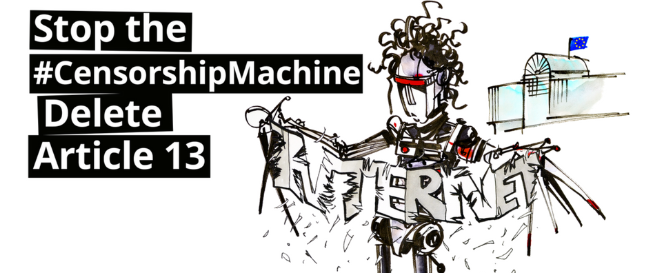ARTICLE 13: The European Fight for Internet Freedom of Speech
October 18, 2018
Across the sea, in the European Union, a legal battle is brewing over one of the most controversial documents that have ever been brought before the European Commission, which represents countries when laws are being made. This document is the now infamous Article 13, which is a copyright law which will focus on stopping the unauthorized use of photos from companies that have not given their permission for the use of their images. The law has sparked controversy over the EU’s protection of freedom of speech.
The reason Article 13 has so many worried over the EU’s protection of freedom of speech is that it will greatly restrict what people will be able to post online. Companies’ restrictions and copyrights over their images will stop many for posting their images for fear of a heavy fine or even possible jail time. This has outraged many of the internet community because it will make one thing nearly impossible: memes. Meme pages on social media apps like Reddit and Instagram have had a field day making fun of the controversial EU copyright law with this popular form of internet comedy. They’ve mocked the EU’s decision by posting images of popular meme formats that have been drawn instead of featuring popular images that could be copyrighted. This is meant to show the absurdity of banning popular images for the sake of copyright.
Many think that Article 13 could have a negative impact on the U.S. as well. This is because Article 13 shares striking resemblances to the Net Neutrality controversy that swept the U.S. in the latter half of 2017. Simplified, Net Neutrality is supposed to keep corporations like Google from discriminating against users and smaller applications. Article 13 will help larger corporations dominate smaller ones, just like the repeal of Net Neutrality.
In short, the passing of Article 13 could possibly impact other parts of the world in a negative manner in terms of free speech. With this basic human right the Constitution deems “unalienable” constantly degrading across the world, Article 13 could possibly deal the internet’s and possibly the world’s freedom of speech a near fatal blow. All we can do is hope that in January of 2019, when the final vote is due, that the European Commission will reach an internet-friendly agreement.
Bibliography:
Reynolds, Matt. “What Is Article 13? The EU’s Divisive New Copyright Plan Explained.” WIRED, WIRED UK, 5 Oct.2018,www.wired.co.uk/article/what-is-article-13-article-11-european-directive-on-copyright-explained-meme-ban.















